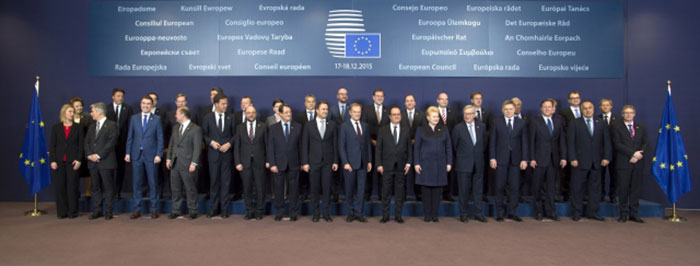1. Over the past months, the European Council has developed a strategy aimed at stemming the unprecedented migratory flows Europe is facing. However, implementation is insufficient and has to be speeded up. For the integrity of Schengen to be safeguarded it is indispensable to regain control over the external borders. Deficiencies, notably as regards hotspots, relocation and returns, must be rapidly addressed. The EU institutions and the Member States must urgently:
a) address the shortcomings at the Schengen external borders, notably by ensuring systematic security checks with relevant databases, and prevent document fraud;
b) address deficiencies in the functioning of hotspots, including by establishing the necessary reception capacity to achieve their objectives; rapidly agree a precise calendar for further hotspots to become operational; ensure that Frontex and EASO have the necessary expertise and equipment;
c) ensure systematic and complete identification, registration and fingerprinting, and take measures to tackle refusal of registration and stem irregular secondary flows;
d) implement relocation decisions as well as consider including among the beneficiaries of existing decisions other Member States under high pressure who have requested this;
e) take concrete measures to ensure the actual return and readmission of people not authorised to stay and provide support to Member States as regards return operations;
f) enhance measures for fighting smuggling and trafficking of human beings;
g) ensure implementation and operational follow up to:
the High Level Conference on the Eastern Mediterranean – Western Balkans route; in this context, it is important to help non EU Member States along the Western Balkans route to accomplish registration according to EU standards;
• the Valletta Summit, particularly as regards returns and readmission, and
• the EU-Turkey Statement of 29 November 2015 and the EU-Turkey Action Plan; in this context COREPER is asked to rapidly conclude its work on how to mobilise the 3 billion euro for the Turkey Refugee Facility;
h) continue implementing the agreed resettlement scheme;
i) continue to closely monitor flows along migration routes so as to be able to rapidly react to developments.
2. The Council should continue work on the crisis relocation mechanism taking into account experience gained, and rapidly decide on its position on the list of safe countries of origin. The Council is invited to rapidly examine the situation concerning Afghanistan. The Council should rapidly examine the Commission proposals of 15 December on a “European Border and Coast Guard”, the Schengen Borders Code, “A voluntary humanitarian admission scheme”, and travel documents for returns. The Council should adopt its position on the “European Border and Coast Guard” under the Netherlands Presidency. The Commission will rapidly present the review of the Dublin system; in the meantime, existing rules must be implemented. It will also soon present a revised proposal on Smart Borders.
3. The Presidency, the Commission and the High Representative will report back on progress before the February meeting of the European Council.



